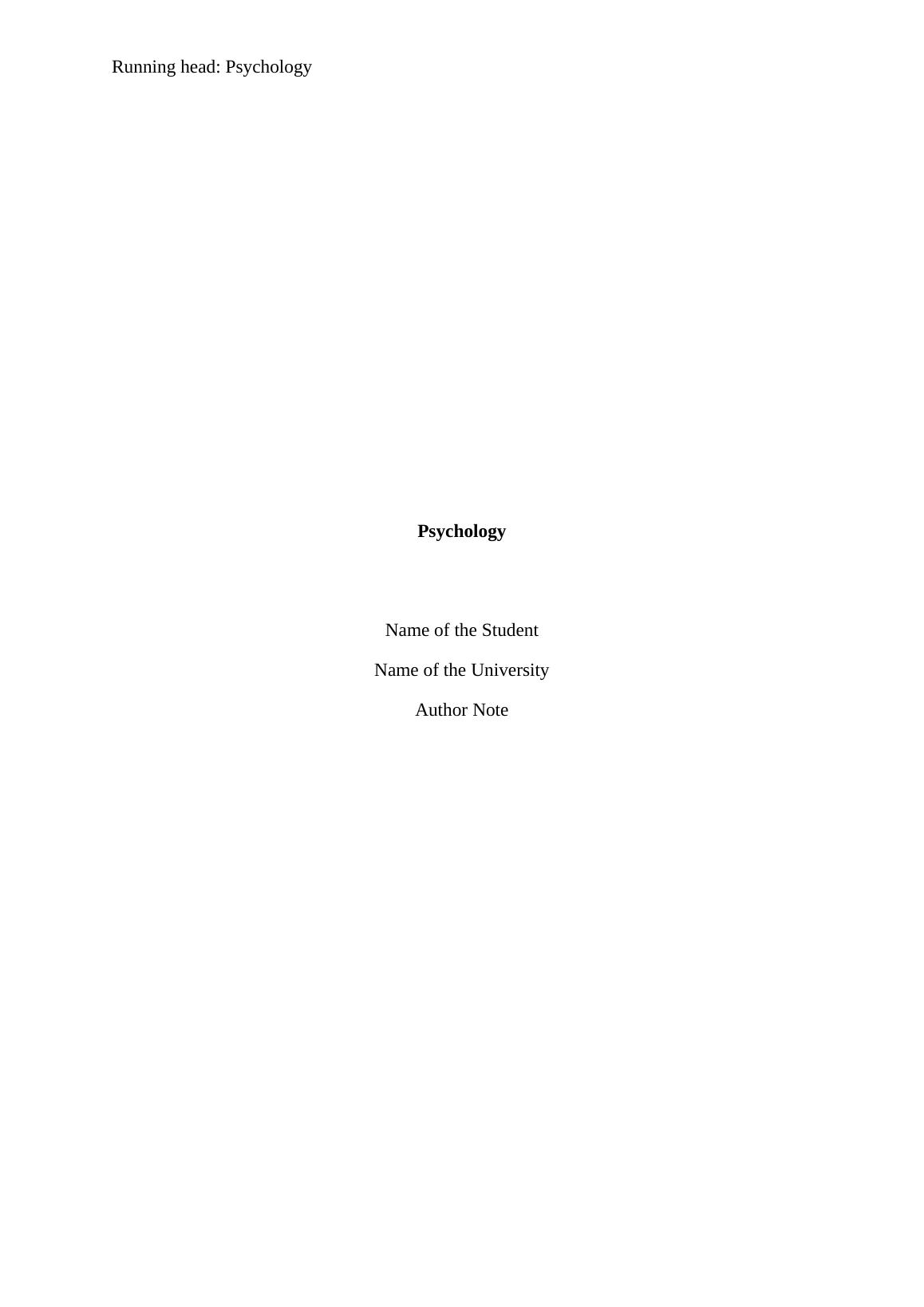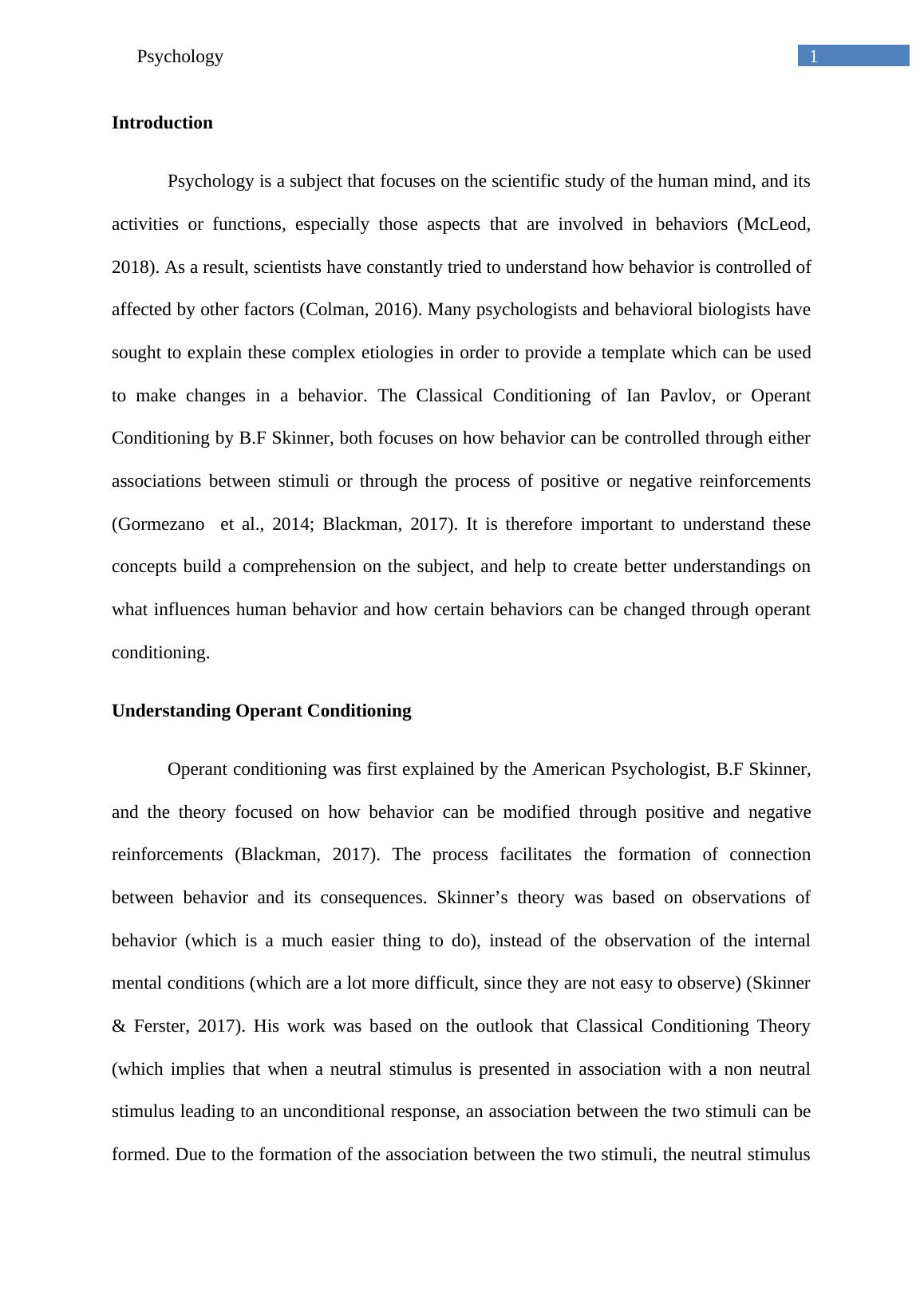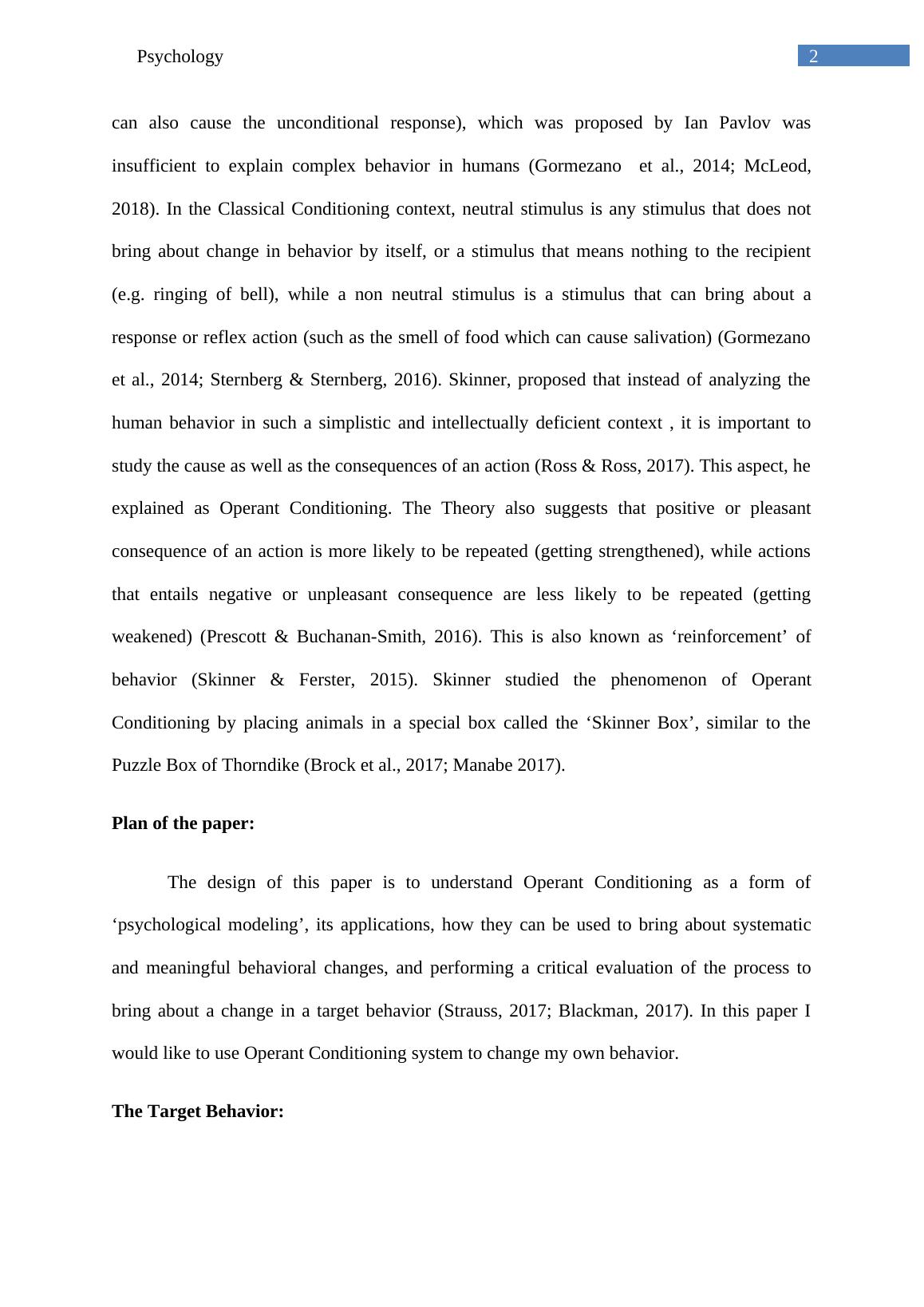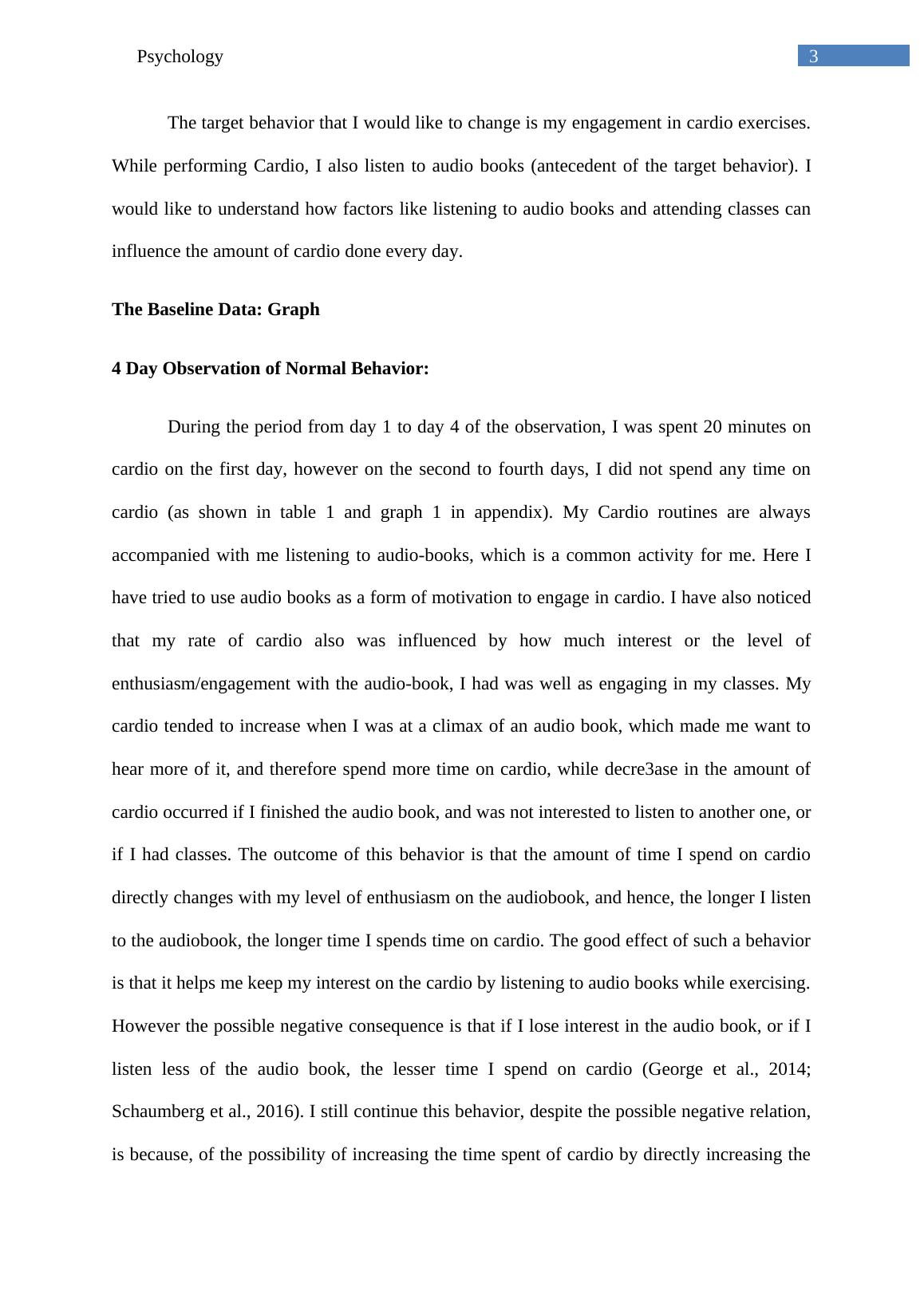Classical Conditioning and Intellectual Deficit - PDF
12 Pages2915 Words23 Views
Added on 2021-04-17
Classical Conditioning and Intellectual Deficit - PDF
Added on 2021-04-17
ShareRelated Documents
Running head: Psychology
Psychology
Name of the Student
Name of the University
Author Note
Psychology
Name of the Student
Name of the University
Author Note

1Psychology
Introduction
Psychology is a subject that focuses on the scientific study of the human mind, and its
activities or functions, especially those aspects that are involved in behaviors (McLeod,
2018). As a result, scientists have constantly tried to understand how behavior is controlled of
affected by other factors (Colman, 2016). Many psychologists and behavioral biologists have
sought to explain these complex etiologies in order to provide a template which can be used
to make changes in a behavior. The Classical Conditioning of Ian Pavlov, or Operant
Conditioning by B.F Skinner, both focuses on how behavior can be controlled through either
associations between stimuli or through the process of positive or negative reinforcements
(Gormezano et al., 2014; Blackman, 2017). It is therefore important to understand these
concepts build a comprehension on the subject, and help to create better understandings on
what influences human behavior and how certain behaviors can be changed through operant
conditioning.
Understanding Operant Conditioning
Operant conditioning was first explained by the American Psychologist, B.F Skinner,
and the theory focused on how behavior can be modified through positive and negative
reinforcements (Blackman, 2017). The process facilitates the formation of connection
between behavior and its consequences. Skinner’s theory was based on observations of
behavior (which is a much easier thing to do), instead of the observation of the internal
mental conditions (which are a lot more difficult, since they are not easy to observe) (Skinner
& Ferster, 2017). His work was based on the outlook that Classical Conditioning Theory
(which implies that when a neutral stimulus is presented in association with a non neutral
stimulus leading to an unconditional response, an association between the two stimuli can be
formed. Due to the formation of the association between the two stimuli, the neutral stimulus
Introduction
Psychology is a subject that focuses on the scientific study of the human mind, and its
activities or functions, especially those aspects that are involved in behaviors (McLeod,
2018). As a result, scientists have constantly tried to understand how behavior is controlled of
affected by other factors (Colman, 2016). Many psychologists and behavioral biologists have
sought to explain these complex etiologies in order to provide a template which can be used
to make changes in a behavior. The Classical Conditioning of Ian Pavlov, or Operant
Conditioning by B.F Skinner, both focuses on how behavior can be controlled through either
associations between stimuli or through the process of positive or negative reinforcements
(Gormezano et al., 2014; Blackman, 2017). It is therefore important to understand these
concepts build a comprehension on the subject, and help to create better understandings on
what influences human behavior and how certain behaviors can be changed through operant
conditioning.
Understanding Operant Conditioning
Operant conditioning was first explained by the American Psychologist, B.F Skinner,
and the theory focused on how behavior can be modified through positive and negative
reinforcements (Blackman, 2017). The process facilitates the formation of connection
between behavior and its consequences. Skinner’s theory was based on observations of
behavior (which is a much easier thing to do), instead of the observation of the internal
mental conditions (which are a lot more difficult, since they are not easy to observe) (Skinner
& Ferster, 2017). His work was based on the outlook that Classical Conditioning Theory
(which implies that when a neutral stimulus is presented in association with a non neutral
stimulus leading to an unconditional response, an association between the two stimuli can be
formed. Due to the formation of the association between the two stimuli, the neutral stimulus

2Psychology
can also cause the unconditional response), which was proposed by Ian Pavlov was
insufficient to explain complex behavior in humans (Gormezano et al., 2014; McLeod,
2018). In the Classical Conditioning context, neutral stimulus is any stimulus that does not
bring about change in behavior by itself, or a stimulus that means nothing to the recipient
(e.g. ringing of bell), while a non neutral stimulus is a stimulus that can bring about a
response or reflex action (such as the smell of food which can cause salivation) (Gormezano
et al., 2014; Sternberg & Sternberg, 2016). Skinner, proposed that instead of analyzing the
human behavior in such a simplistic and intellectually deficient context , it is important to
study the cause as well as the consequences of an action (Ross & Ross, 2017). This aspect, he
explained as Operant Conditioning. The Theory also suggests that positive or pleasant
consequence of an action is more likely to be repeated (getting strengthened), while actions
that entails negative or unpleasant consequence are less likely to be repeated (getting
weakened) (Prescott & Buchanan-Smith, 2016). This is also known as ‘reinforcement’ of
behavior (Skinner & Ferster, 2015). Skinner studied the phenomenon of Operant
Conditioning by placing animals in a special box called the ‘Skinner Box’, similar to the
Puzzle Box of Thorndike (Brock et al., 2017; Manabe 2017).
Plan of the paper:
The design of this paper is to understand Operant Conditioning as a form of
‘psychological modeling’, its applications, how they can be used to bring about systematic
and meaningful behavioral changes, and performing a critical evaluation of the process to
bring about a change in a target behavior (Strauss, 2017; Blackman, 2017). In this paper I
would like to use Operant Conditioning system to change my own behavior.
The Target Behavior:
can also cause the unconditional response), which was proposed by Ian Pavlov was
insufficient to explain complex behavior in humans (Gormezano et al., 2014; McLeod,
2018). In the Classical Conditioning context, neutral stimulus is any stimulus that does not
bring about change in behavior by itself, or a stimulus that means nothing to the recipient
(e.g. ringing of bell), while a non neutral stimulus is a stimulus that can bring about a
response or reflex action (such as the smell of food which can cause salivation) (Gormezano
et al., 2014; Sternberg & Sternberg, 2016). Skinner, proposed that instead of analyzing the
human behavior in such a simplistic and intellectually deficient context , it is important to
study the cause as well as the consequences of an action (Ross & Ross, 2017). This aspect, he
explained as Operant Conditioning. The Theory also suggests that positive or pleasant
consequence of an action is more likely to be repeated (getting strengthened), while actions
that entails negative or unpleasant consequence are less likely to be repeated (getting
weakened) (Prescott & Buchanan-Smith, 2016). This is also known as ‘reinforcement’ of
behavior (Skinner & Ferster, 2015). Skinner studied the phenomenon of Operant
Conditioning by placing animals in a special box called the ‘Skinner Box’, similar to the
Puzzle Box of Thorndike (Brock et al., 2017; Manabe 2017).
Plan of the paper:
The design of this paper is to understand Operant Conditioning as a form of
‘psychological modeling’, its applications, how they can be used to bring about systematic
and meaningful behavioral changes, and performing a critical evaluation of the process to
bring about a change in a target behavior (Strauss, 2017; Blackman, 2017). In this paper I
would like to use Operant Conditioning system to change my own behavior.
The Target Behavior:

3Psychology
The target behavior that I would like to change is my engagement in cardio exercises.
While performing Cardio, I also listen to audio books (antecedent of the target behavior). I
would like to understand how factors like listening to audio books and attending classes can
influence the amount of cardio done every day.
The Baseline Data: Graph
4 Day Observation of Normal Behavior:
During the period from day 1 to day 4 of the observation, I was spent 20 minutes on
cardio on the first day, however on the second to fourth days, I did not spend any time on
cardio (as shown in table 1 and graph 1 in appendix). My Cardio routines are always
accompanied with me listening to audio-books, which is a common activity for me. Here I
have tried to use audio books as a form of motivation to engage in cardio. I have also noticed
that my rate of cardio also was influenced by how much interest or the level of
enthusiasm/engagement with the audio-book, I had was well as engaging in my classes. My
cardio tended to increase when I was at a climax of an audio book, which made me want to
hear more of it, and therefore spend more time on cardio, while decre3ase in the amount of
cardio occurred if I finished the audio book, and was not interested to listen to another one, or
if I had classes. The outcome of this behavior is that the amount of time I spend on cardio
directly changes with my level of enthusiasm on the audiobook, and hence, the longer I listen
to the audiobook, the longer time I spends time on cardio. The good effect of such a behavior
is that it helps me keep my interest on the cardio by listening to audio books while exercising.
However the possible negative consequence is that if I lose interest in the audio book, or if I
listen less of the audio book, the lesser time I spend on cardio (George et al., 2014;
Schaumberg et al., 2016). I still continue this behavior, despite the possible negative relation,
is because, of the possibility of increasing the time spent of cardio by directly increasing the
The target behavior that I would like to change is my engagement in cardio exercises.
While performing Cardio, I also listen to audio books (antecedent of the target behavior). I
would like to understand how factors like listening to audio books and attending classes can
influence the amount of cardio done every day.
The Baseline Data: Graph
4 Day Observation of Normal Behavior:
During the period from day 1 to day 4 of the observation, I was spent 20 minutes on
cardio on the first day, however on the second to fourth days, I did not spend any time on
cardio (as shown in table 1 and graph 1 in appendix). My Cardio routines are always
accompanied with me listening to audio-books, which is a common activity for me. Here I
have tried to use audio books as a form of motivation to engage in cardio. I have also noticed
that my rate of cardio also was influenced by how much interest or the level of
enthusiasm/engagement with the audio-book, I had was well as engaging in my classes. My
cardio tended to increase when I was at a climax of an audio book, which made me want to
hear more of it, and therefore spend more time on cardio, while decre3ase in the amount of
cardio occurred if I finished the audio book, and was not interested to listen to another one, or
if I had classes. The outcome of this behavior is that the amount of time I spend on cardio
directly changes with my level of enthusiasm on the audiobook, and hence, the longer I listen
to the audiobook, the longer time I spends time on cardio. The good effect of such a behavior
is that it helps me keep my interest on the cardio by listening to audio books while exercising.
However the possible negative consequence is that if I lose interest in the audio book, or if I
listen less of the audio book, the lesser time I spend on cardio (George et al., 2014;
Schaumberg et al., 2016). I still continue this behavior, despite the possible negative relation,
is because, of the possibility of increasing the time spent of cardio by directly increasing the

End of preview
Want to access all the pages? Upload your documents or become a member.
Related Documents
Behavioral Perspective Assignmentlg...
|5
|657
|139
Associative Learning in Psychologylg...
|5
|1008
|84
Psychology: Behaviourist Theory in Child Learning and Development Essay 2022lg...
|8
|2126
|34
Operant and Classical Conditioning Theories in Psychologylg...
|4
|726
|410
Operant and Classical Conditioning Theories in Psychologylg...
|4
|732
|267
Introduction to Psychology Theory 2022lg...
|10
|2712
|26
